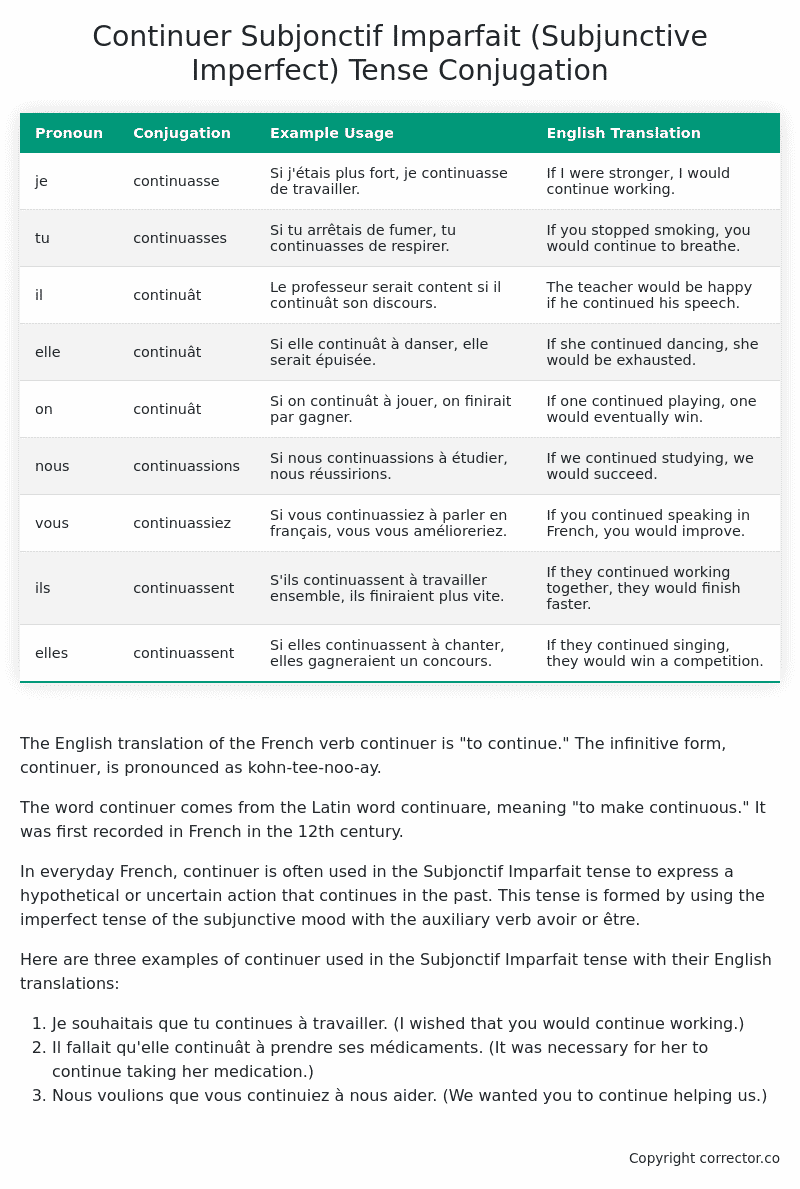Subjonctif Imparfait (Subjunctive Imperfect) Tense Conjugation of the French Verb continuer
Introduction to the verb continuer
The English translation of the French verb continuer is “to continue.” The infinitive form, continuer, is pronounced as kohn-tee-noo-ay.
The word continuer comes from the Latin word continuare, meaning “to make continuous.” It was first recorded in French in the 12th century.
In everyday French, continuer is often used in the Subjonctif Imparfait tense to express a hypothetical or uncertain action that continues in the past. This tense is formed by using the imperfect tense of the subjunctive mood with the auxiliary verb avoir or être.
Here are three examples of continuer used in the Subjonctif Imparfait tense with their English translations:
- Je souhaitais que tu continues à travailler. (I wished that you would continue working.)
- Il fallait qu’elle continuât à prendre ses médicaments. (It was necessary for her to continue taking her medication.)
- Nous voulions que vous continuiez à nous aider. (We wanted you to continue helping us.)
Table of the Subjonctif Imparfait (Subjunctive Imperfect) Tense Conjugation of continuer
| Pronoun | Conjugation | Example Usage | English Translation |
|---|---|---|---|
| je | continuasse | Si j’étais plus fort, je continuasse de travailler. | If I were stronger, I would continue working. |
| tu | continuasses | Si tu arrêtais de fumer, tu continuasses de respirer. | If you stopped smoking, you would continue to breathe. |
| il | continuât | Le professeur serait content si il continuât son discours. | The teacher would be happy if he continued his speech. |
| elle | continuât | Si elle continuât à danser, elle serait épuisée. | If she continued dancing, she would be exhausted. |
| on | continuât | Si on continuât à jouer, on finirait par gagner. | If one continued playing, one would eventually win. |
| nous | continuassions | Si nous continuassions à étudier, nous réussirions. | If we continued studying, we would succeed. |
| vous | continuassiez | Si vous continuassiez à parler en français, vous vous amélioreriez. | If you continued speaking in French, you would improve. |
| ils | continuassent | S’ils continuassent à travailler ensemble, ils finiraient plus vite. | If they continued working together, they would finish faster. |
| elles | continuassent | Si elles continuassent à chanter, elles gagneraient un concours. | If they continued singing, they would win a competition. |
Other Conjugations for Continuer.
Le Present (Present Tense) Conjugation of the French Verb continuer
Imparfait (Imperfect) Tense Conjugation of the French Verb continuer
Passé Simple (Simple Past) Tense Conjugation of the French Verb continuer
Passé Composé (Present Perfect) Tense Conjugation of the French Verb continuer
Futur Simple (Simple Future) Tense Conjugation of the French Verb continuer
Futur Proche (Near Future) Tense Conjugation of the French Verb continuer
Plus-que-parfait (Pluperfect) Tense Conjugation of the French Verb continuer
Passé Antérieur (Past Anterior) Tense Conjugation of the French Verb continuer
Futur Antérieur (Future Anterior) Tense Conjugation of the French Verb continuer
Subjonctif Présent (Subjunctive Present) Tense Conjugation of the French Verb continuer
Subjonctif Passé (Subjunctive Past) Tense Conjugation of the French Verb continuer
Subjonctif Imparfait (Subjunctive Imperfect) Tense Conjugation of the French Verb continuer (this article)
Subjonctif Plus-que-parfait (Subjunctive Pluperfect) Tense Conjugation of the French Verb continuer
Conditionnel Présent (Conditional Present) Tense Conjugation of the French Verb continuer
Conditionnel Passé (Conditional Past) Tense Conjugation of the French Verb continuer
L’impératif Présent (Imperative Present) Tense Conjugation of the French Verb continuer
L’infinitif Présent (Infinitive Present) Tense Conjugation of the French Verb continuer
Struggling with French verbs or the language in general? Why not use our free French Grammar Checker – no registration required!
Get a FREE Download Study Sheet of this Conjugation 🔥
Simply right click the image below, click “save image” and get your free reference for the continuer Subjonctif Imparfait tense conjugation!

Continuer – About the French Subjonctif Imparfait (Subjunctive Imperfect) Tense
Formation
Common Everyday Usage Patterns
Interactions with Other Tenses
Subjonctif Présent
Indicatif Passé Composé
Conditional
Conditional Perfect
Summary
I hope you enjoyed this article on the verb continuer. Still in a learning mood? Check out another TOTALLY random French verb conjugation!


